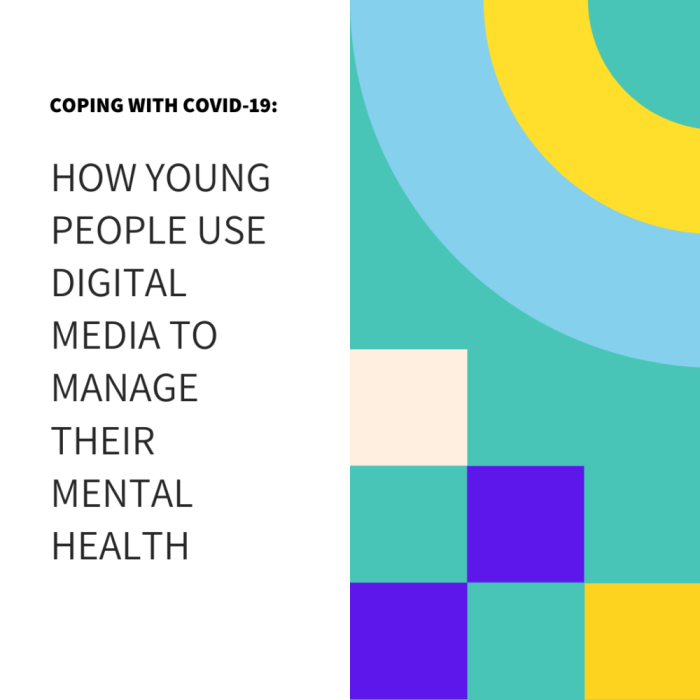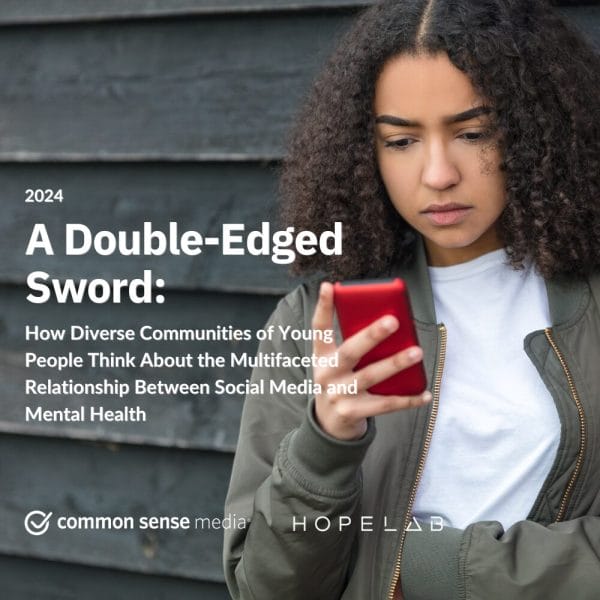One Year into the Pandemic, a New Survey Reveals That Teens and Young Adults Are Actively Turning to Online Sources to Cope with Mental Health
Findings show that, for many young people, social media is a positive tool to help deal with depression and promote well-being, especially during COVID.
San Francisco (March 17, 2021)—Teens and young adults have spent the last year isolated from friends, dealing with the coronavirus, and reckoning with the country’s racial and political divisions. Now a major national study released today, Coping with COVID-19: How Young People Use Digital Media to Manage Their Mental Health, shows that while depression rates increased significantly from 2018, especially for teens and young adults who have had coronavirus infections in their families, so, too, has the importance of social media.
The report, released by Common Sense, the California Health Care Foundation, and Hopelab, found that 43% of those surveyed say that using social media makes them feel better when they’re depressed, stressed, or anxious, compared to 27% who said so two years ago.
The report presents findings from a nationally representative survey of more than 1,500 14- to 22-year-olds in the U.S., and reveals these additional key findings:
-
- An increase in depression: Nearly four in 10 teens and young adults (38%) report symptoms of moderate to severe depression, up from 25% just two years ago.
- Coronavirus impacts: Depression is much higher among young people who report a coronavirus infection in their family (51%) than among those not directly affected by the coronavirus (36%).
- Social media: Those with depression are twice as likely to say social media is “very” important for getting support or advice than they were two years ago (26% vs. 11% in 2018).
“We have an entire generation of teens and young adults who are significantly affected by COVID-19,” said James P. Steyer, founder and CEO of Common Sense. “The research is clear that our youth are suffering, and any road map for COVID recovery has to center on their mental well-being. But this report also shows that young people are using technology to take control of their mental health, and it would be wise for tech companies to do more to support them where they are.”
The report takes a deeper dive to illustrate the unique and nuanced roles social media and technology play in the well-being of teens and young adults during the pandemic, including connecting with family and friends, seeking health information online, and accessing mental health tools:
-
- Social connection: The vast majority of youth say social media has been “very” or “somewhat” important during the pandemic in staying connected to friends and family (86%), staying informed about current events (77%), and learning how to protect themselves from the virus (70%).
- Information access: More than 8 in 10 youth (85%) have looked for health information online, with “depression,” “stress,” and “anxiety” among the top searches.
- Mobile apps: Nearly 7 in 10 (69%) have used mobile apps related to health, including apps for sleep, meditation, and stress reduction.
- Digital health tools: Nearly half (47%) have used digital tools to connect with health providers, such as doctors, nurses, or therapists, through video appointments, texting, online messaging systems, or other apps, and the vast majority found it helpful.
“Understanding how young people respond to challenges, such as isolation, loneliness, depression, anxiety, and other mental health concerns, will allow us to address these issues more effectively,” says Margaret Laws, president and CEO of Hopelab. “These findings suggest the need for even greater investment in the digital mental health space and equitable access to these important tools.”
“We all have a shared responsibility to create the societal conditions to help young people thrive,” says Sandra R. Hernández, M.D., president and chief executive officer, California Health Care Foundation. “Teens and young adults faced substantial mental health challenges before the pandemic took hold of their lives. Their schooling and social connections have been radically disrupted, and they are relying even more heavily on digital media. We are just beginning to understand the consequences of these trends.”
Other key findings from the report include:
-
- Social media has played an especially important role for those directly affected by COVID-19. Young people who say that they or a family member have been infected by the virus are more likely than their peers to consider social media “very” important in keeping up with current events (47% vs. 32%) and learning how to protect themselves from the virus (43% vs. 29%).
- LGBTQ+ teens and young adults face serious health concerns compared to non-LGBTQ+ youth. The majority of LGBTQ+ youth (74%) encounter homophobic content online and on social media, and 65% report symptoms of moderate to severe depression, twice the percentage of non-LGBTQ+ youth (31%). Meanwhile, social media is even more important to LGBTQ+ youth than for others their age for finding inspiration, support, and advice, and for expressing themselves creatively. Almost all (98%) LGBTQ+ youth have looked to digital tools for health purposes, and more than half have used telehealth services.
- Black youth are disproportionately affected by COVID-19, and most encounter racist content online. One in five Black youth (20%) had a coronavirus infection themselves or in the family (twice as high as White youth), the majority of Black youth (69%) have encountered racist content online or on social media, and 37% report symptoms of moderate to severe depression. Ninety percent of Black youth have used digital tools for health purposes, while four in 10 Black youth have used telehealth services to connect with providers online.
- Hispanic and Latinx youth have more family responsibilities during COVID-19. Nineteen percent of Hispanic/Latinx youth had a coronavirus infection themselves or in the family (also twice as high as White youth), and almost a quarter of Hispanic/Latinx youth have taken on more family responsibilities since the start of the pandemic; sixty-seven percent also encounter racist content online, and 37% report symptoms of moderate to severe depression (an increase of 25% compared to Hispantic/Latinx youth in 2018). The majority of Hispanic/Latinx youth (93%) have used digital tools for health purposes, and almost half (43%) have used telehealth services to connect with providers online.
- Female youth are more likely than males to use digital tools around mental health. For example, they are more likely to search for mental health information online (71% vs. 49%), with substantial differences on issues such as anxiety (21 percentage points), eating disorders (18 percentage points), and depression (17 percentage points). They are also more likely to use mobile apps on mental health topics such as meditation, mood tracking, and stress reduction (38% vs. 24%). More teen girls (age 14–17) say they “often” encounter sexist content on social media in 2020 than those who did in 2018 (24% vs. 14%), but the percent who say social media makes them feel “less lonely” has also increased, from 25% in 2018 to 50% during the pandemic.
- Young people at risk for problematic substance use are turning to the internet for help. One in ten U.S. young people are at risk for problematic drug or alcohol use. The vast majority of those at risk are accessing digital health tools, and they are doing so at an even higher rate than others their age: Forty-six percent have searched for information on drug and alcohol abuse, compared to just 15% of those not at risk; and nearly two-thirds (63%) have searched for information about smoking or vaping (compared to 19% of others.)
Methodology
The report presents data from a nationally representative survey of more than 1,500 14- to 22-year-olds in the U.S., conducted in September–November 2020 by the National Opinion Research Center (NORC) at the University of Chicago, on behalf of Common Sense, the California Health Care Foundation, and Hopelab. The extensive use of open-ended questions allowed teens and young adults to share their experiences in their own words. The survey included a screener (CRAFFT) to identify youth at risk for problematic substance use and a screener (PHQ-8) to identify youth with symptoms of depression. The findings include comparisons with 2018 surveys of separate samples of 14- to 22-year-olds (Rideout & Fox, 2018) and 14- to 17-year-olds (Rideout & Robb, 2018). The report was written by Victoria Rideout of VJR Consulting, Susannah Fox of Internet Geologist LLC, and Alanna Peebles and Michael Robb of Common Sense.
A copy of the report and fact sheets can be downloaded here.
###
About Common Sense
Common Sense is the nation’s leading nonprofit organization dedicated to improving the lives of kids and families by providing the trustworthy information, education, and independent voice they need to thrive in the 21st century. Learn more at commonsense.org.
About Hopelab
Hopelab is a nonprofit social innovation lab based in San Francisco that creates behavior-change tech to help teens and young adults live happier, healthier lives. The organization works with young people to co-create interventions grounded in behavioral science and human-centered design, conducts rigorous testing, and distributes these solutions in collaboration with partners. Learn more at hopelab.org.
About the California Health Care Foundation
The California Health Care Foundation is dedicated to advancing meaningful, measurable improvements in the way the health care delivery system provides care to the people of California, particularly those with low incomes and those whose needs are not well served by the status quo. We work to ensure that people have access to the care they need, when they need it, at a price they can afford. CHCF informs policymakers and industry leaders, invests in ideas and innovations, and connects with changemakers to create a more responsive, patient-centered health care system. Learn more at chcf.org.
Press contacts:
Sabrina Chin, Common Sense Media
(415) 351-9737
Robin Raskob, Hopelab
(415) 425-5654
Lisa Cohen, Common Sense Media
(310) 395-2544
Lisa Aliferis, CHCF
(510) 604-5400





